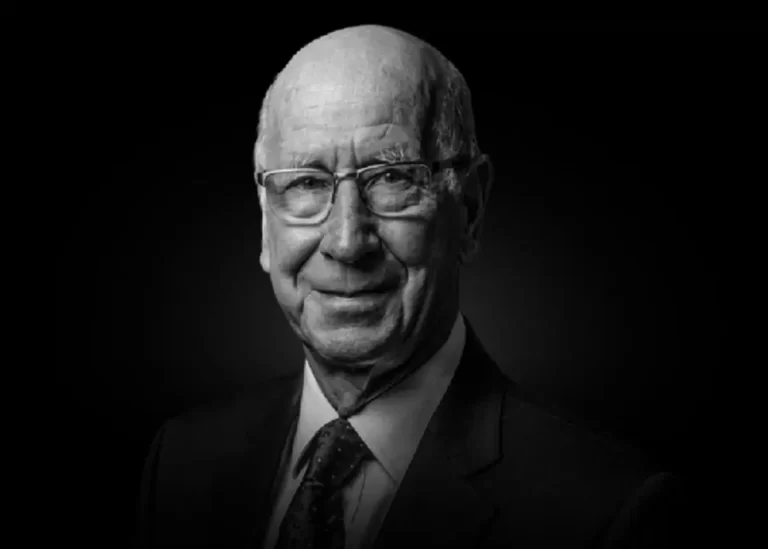Thousands of people lined the streets of Manchester on Monday to pay their final respects to Manchester United and England great Bobby Charlton, with Alex Ferguson and Prince William among the mourners.
The 1966 World Cup winner, widely regarded as one of England’s greatest players, died on October 21 at the age of 86 after a fall at his care home.
ALSO READ: Chelsea, Manchester City Premier League match thrills fans
Manchester people pay tribute to Charlton
Crowds clapped warmly and held banners as the funeral cortege drove past United’s Old Trafford ground on its way to a private funeral service at Manchester Cathedral to celebrate Charlton’s life.
The hearse passed the famous “United Trinity” statue immortalising Charlton, Denis Law and George Best as members of the club’s under-18 and under-21 squads formed a guard of honour.
ALSO READ: Manchester United on brink of Champions League exit
High on the glass wall of the East Stand were two huge black and white photographs, one of Charlton in his playing days and the other showing him as an elder statesman, flanking the words “Sir Bobby Charlton, 1937-2023. Forever Loved”.
Around 1,000 guests, including former United manager Ferguson, England boss Gareth Southgate and Prince William, the Football Association president, arrived for the service, along with current and former players.
ALSO READ: Rashford returns for Manchester United’s Champions League clash
What has to be done
Former United captain Bryan Robson, speaking before the service, told the BBC: “For a player to win the World Cup, win the Champions League and have such a long and successful career, you’ve got to be a fantastic player to be able to achieve that.
“But Sir Bob wasn’t just a great player; he was a great person and had time for everybody.” Former teammate Alex Stepney said Charlton remained humble despite his success.
ALSO READ: Manchester United strive for Champions League as pressure rise
“It was about winning, and that was what Bobby Charlton was all about,” he said. “A humble guy, a great family man. It never went to his head.”
Former United chief executive David Gill gave a eulogy during the service, describing Charlton as a “legend, an icon and a very dear and loyal, much-loved colleague and friend”.
ALSO READ: RIP: Manchester United legend dies
“Football is a tribal sport, but Bobby was universally admired,” he said. The funeral ended with the chiming of bells as Charlton’s coffin, covered in white flowers, was carried out by pallbearers.
Ferguson described Charlton, who played a key part in his appointment as manager at Old Trafford, as a “tower of strength” during his trophy-laden 26-year spell as manager.
ALSO READ: BREAKING – Manchester United and England legend Sir Bobby Charlton dies
The speakers were fantastic
“It was a sombre occasion. The speakers were fantastic, especially his grandson,” he told the BBC. “He was magnificent. It’s not easy to go up and speak. “Bobby Charlton was a wonderful, humble man, and I was at Manchester United because of Bobby Charlton.”
Former England captain Gary Lineker said the service was “emotive and meaningful”, describing Charlton as “more than just a footballer in many ways”.
“He was synonymous with the word ‘football’,” he said. “You could go anywhere in the world, even places where they didn’t speak English, and they’d say one thing to you, and that was ‘Bobby Charlton’, and that shows his fame, but it also shows how much respect and love he has around the world.”
Charlton was a key member of England’s victorious 1966 World Cup team alongside his late brother Jack. He won 106 caps for England, scoring 49 goals.
He also enjoyed great success at club level with United, who became the first English club to win the European Cup in 1968, a decade after he survived an air crash in Munich, which killed eight of his teammates.
He played 758 games and scored 249 goals for United between 1956 and 1973. Both were long-standing club records until they were broken by Ryan Giggs and Wayne Rooney.
Charlton, who won the Ballon d’Or in 1966, returned to the club with which he had made his name as a director in 1984 and remained a major figure at Old Trafford until his later years. In 2020, it was announced he had been diagnosed with dementia, and as the disease took hold, he stopped attending matches.
© Agence France-Presse

